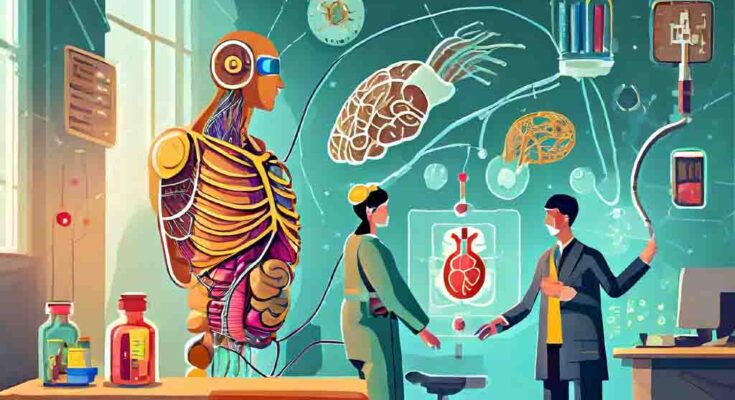The integration of Artificial Intelligence in healthcare marks a transformative paradigm shift, revolutionizing the industry’s landscape. AI, a branch of computer science that simulates human intelligence, is strategically applied to enhance various facets of healthcare, promising unprecedented advancements. From diagnostic innovations and drug discovery to administrative efficiency and personalized medicine, AI is a catalyst for positive change.
What is artificial intelligence?
Artificial Intelligence (AI) refers to the simulation of human intelligence in machines that are programmed to think and learn like humans. The goal of AI is to create systems that can perform tasks that typically require human intelligence, such as visual perception, speech recognition, decision-making, and language translation.
AI involves the development of algorithms and models that enable computers to analyze data, recognize patterns, and make decisions. There are various subfields within AI, and these can be broadly categorized into two types:
Narrow or Weak AI (ANI):
This type of AI is designed and trained for a particular task. It excels in performing a specific function but lacks the broad cognitive abilities of humans. Examples include speech recognition systems, image recognition software, and virtual personal assistants.
General or Strong AI (AGI):
This is a more advanced form of AI that possesses the ability to understand, learn, and apply knowledge across a wide range of tasks—similar to human intelligence. AGI has the theoretical capacity to outperform humans in nearly every cognitive task.
AI techniques can be categorized into three main types:
Machine Learning (ML):
ML is a subset of AI that focuses on developing algorithms that enable computers to learn from data. It involves training models on large datasets and allowing them to make predictions or decisions without explicit programming.
Natural Language Processing (NLP):
NLP enables machines to understand, interpret, and generate human language. It plays a crucial role in applications like language translation, sentiment analysis, and chatbots.
Computer Vision:
This involves enabling machines to interpret and make decisions based on visual data. Computer vision is used in applications like facial recognition, object detection, and autonomous vehicles.
AI is applied in various industries, including healthcare, finance, education, transportation, and more. As technology continues to advance, AI is expected to play an increasingly significant role in shaping the future of various fields, improving efficiency, and solving complex problems.
Introduction:
Artificial Intelligence (AI) has emerged as a powerhouse, transforming industries across the globe. In this introductory section, we embark on a journey through the dynamic landscape of AI, witnessing its profound impact on various sectors. From streamlining processes to optimizing decision-making, AI has become a driving force for innovation. Focusing on the healthcare realm, we explore the integration of AI and its potential to revolutionize patient care. This section provides a concise overview of AI’s versatility across industries, laying the foundation for a closer examination of its role in healthcare. Our thesis statement underscores the transformative nature of AI, emphasizing its pivotal role in elevating healthcare outcomes. Join us as we unravel the intricate threads of AI integration in healthcare, promising a future where technology converges with compassion to redefine the very essence of medical practices.
II. Diagnostic Advancements
In this segment, we delve into the transformative realm of Diagnostic Advancements powered by Artificial Intelligence (AI).
Medical Imaging Analysis
Unlocking a new era in healthcare, AI propels the analysis of medical images to unprecedented heights. This subsection unveils the intricate ways in which AI enhances the interpretation of X-rays, MRIs, and CT scans. Through sophisticated algorithms, AI augments the precision and speed of diagnostic processes, offering healthcare professionals invaluable insights. Real-world instances underscore the success of AI in radiology, showcasing tangible improvements in diagnostic accuracy and efficiency.
Pathology and Histopathology
AI’s impact extends to the microscopic realm, revolutionizing the analysis of pathology slides for swifter and more precise diagnoses. This section delves into the role of AI in histopathology, where algorithms assist in detecting diseases like cancer with unparalleled accuracy. Real-world examples spotlight instances where AI has become a vital ally in the pathologist’s toolkit, contributing to faster identification and more effective management of critical conditions.
III. Drug Discovery and Personalized Medicine
Embarking on the frontier of innovation, this section unveils the instrumental role of Artificial Intelligence (AI) in Drug Discovery and the era of Personalized Medicine.
Drug Target Identification
At the heart of therapeutic breakthroughs lies the accelerated identification of potential drug targets, a feat made possible through the prowess of AI. This subsection demystifies the mechanisms by which AI expedites the discovery process, employing advanced algorithms to navigate vast datasets and pinpoint promising targets. Real-world case studies showcase the success stories of AI-driven drug target identification, underscoring its transformative impact on the efficiency of pharmaceutical research.
Genomic Analysis and Personalized Treatment
In the pursuit of tailoring treatments to individual needs, AI emerges as a key player in the realm of Genomic Analysis and Personalized Treatment. Here, we explore how AI algorithms analyze genomic data to unlock the intricacies of individual genetic profiles. This personalized approach to medicine, guided by AI insights, reshapes treatment plans to maximize efficacy while minimizing side effects. Through illustrative examples, we witness the tangible impact of AI in ushering in a new era where healthcare is uniquely tailored to the genetic makeup of each patient.
IV. Predictive Analytics and Preventive Healthcare
In this segment, we unravel the pivotal role of Artificial Intelligence (AI) in Predictive Analytics and its profound impact on shaping the landscape of Preventive Healthcare.
Disease Prediction
AI’s predictive prowess takes center stage as we delve into its capacity to foresee the likelihood of specific diseases. This subsection navigates the algorithms and methodologies behind AI-driven disease prediction, showcasing its potential to revolutionize healthcare by enabling proactive interventions. Real-world examples spotlight instances where predictive analytics has contributed to preventive healthcare, emphasizing the tangible benefits of early detection and intervention in mitigating health risks.
Remote Patient Monitoring
The integration of AI into healthcare extends beyond traditional settings through the utilization of wearable devices and sensors for Remote Patient Monitoring. Here, we engage in a discourse on how AI-driven technologies provide real-time insights into patients’ health, fostering proactive healthcare management. Case studies illuminate the transformative impact of AI in the realm of remote monitoring, offering a glimpse into a future where technology acts as a vigilant guardian, ensuring the well-being of individuals through continuous and personalized health assessments.
V. Administrative Workflow Optimization
In this section, we unravel the transformative impact of Artificial Intelligence (AI) on Administrative Workflow Optimization, revolutionizing the efficiency of healthcare operations.
Revenue Cycle Management
AI emerges as a game-changer in streamlining the intricate web of administrative tasks within healthcare, particularly in the domain of Revenue Cycle Management (RCM). This subsection elucidates how AI technologies navigate and enhance various aspects of RCM, offering a seamless integration of automation and intelligence. From expediting billing processes to optimizing medical coding and claims processing, AI-driven solutions showcase their prowess in boosting operational efficiency. Real-world examples underscore the tangible benefits, illustrating how AI is reshaping administrative workflows to pave the way for a more streamlined and effective healthcare ecosystem.
VI. Patient Engagement and Support
This section unveils the dynamic landscape of Patient Engagement and Support, with a particular focus on the revolutionary role of Artificial Intelligence (AI) in redefining healthcare interactions.
Virtual Health Assistants
AI-powered chatbots and virtual nurses take center stage in providing comprehensive patient support. This subsection offers an insightful overview of how AI is leveraged to create Virtual Health Assistants, augmenting traditional healthcare communication. From answering queries to offering guidance, these virtual assistants play a pivotal role in enhancing patient engagement. Through illustrative examples, we witness the diverse applications of AI in healthcare support, showcasing its ability to provide timely, personalized, and accessible information to patients, ultimately fostering a more engaged and empowered healthcare community.
VII. Ethical Considerations and Challenges
This section delves into the complex terrain of Ethical Considerations and Challenges surrounding the integration of Artificial Intelligence (AI) in healthcare.
Discussion on the Ethical Implications of AI in Healthcare
As AI continues to redefine healthcare paradigms, an essential conversation arises regarding the ethical implications inherent in its implementation. This subsection engages in a thoughtful dialogue about the ethical considerations surrounding AI applications in healthcare, addressing concerns related to patient autonomy, informed consent, and the responsible use of sensitive medical data.
Exploration of Challenges: Data Privacy, Bias in Algorithms, and the Need for Regulation
In the pursuit of technological advancement, challenges emerge that necessitate careful consideration. This segment explores the triad of challenges — data privacy, algorithmic bias, and the imperative need for regulatory frameworks. It navigates the complexities of safeguarding patient data, mitigating bias in AI algorithms, and establishing ethical guidelines to ensure the responsible and equitable deployment of AI in healthcare. By addressing these challenges, we strive to create a healthcare landscape where the benefits of AI are maximized while ethical standards remain paramount.
VIII. Future Trends and Innovations
In this visionary section, we embark on a journey into the Future Trends and Innovations propelled by Artificial Intelligence (AI) within the healthcare sector.
Overview of Emerging Trends in AI for Healthcare
The ever-evolving landscape of AI in healthcare is marked by a myriad of emerging trends. This subsection provides a comprehensive overview of the latest developments, from advancements in predictive analytics to the integration of AI-driven robotics in surgical procedures. By exploring these trends, we aim to offer insights into the evolving nature of healthcare, where AI serves as a catalyst for transformative advancements.
Discussion on the Potential Future Impact of AI Technologies on the Healthcare Industry
As we peer into the future, the potential impact of AI technologies on the healthcare industry becomes increasingly profound. This segment engages in a thoughtful discussion on the transformative possibilities that lie ahead. From AI-driven diagnostics to personalized treatment plans, the future promises a healthcare landscape where innovation and technology converge to enhance patient care, improve outcomes, and reshape the very fabric of medical practices. Join us as we navigate the exciting frontier of future trends and innovations in AI for healthcare.
IX. Conclusion
As we draw the curtains on this exploration of Artificial Intelligence (AI) in healthcare, a recap of key points emphasizes the transformative impact this technology has had on the industry. From diagnostic enhancements and personalized medicine to predictive analytics and administrative workflow optimization, AI has emerged as a cornerstone, reshaping the way healthcare is delivered. In conclusion, the ongoing and future role of AI in improving patient care remains a beacon of promise. The amalgamation of technology and compassion propels us toward a future where healthcare is not just reactive but anticipatory, ensuring better outcomes and a higher quality of life for patients. As AI continues to evolve, let us anticipate a healthcare landscape that prioritizes innovation, embraces technological advancements, and ultimately, places the well-being of individuals at the forefront of medical progress.
What is artificial intelligence (AI) in healthcare?
Artificial Intelligence in healthcare refers to the application of advanced algorithms and machine learning techniques to analyze and interpret medical data. It aims to improve diagnostic accuracy, personalize treatment plans, streamline administrative tasks, and enhance overall patient care.
How does AI benefit healthcare?
AI brings numerous benefits to healthcare, including improved diagnostic accuracy, personalized treatment plans, enhanced administrative efficiency, predictive analytics for disease prevention, and the potential to accelerate drug discovery and development.
What are some examples of AI applications in healthcare?
AI applications in healthcare include medical image analysis for diagnostics, predictive analytics for disease prevention, virtual health assistants for patient engagement, drug discovery and personalized medicine, and administrative workflow optimization for tasks like billing and claims processing.
Are there ethical concerns with AI in healthcare?
Yes, ethical concerns include issues related to patient privacy, bias in algorithms, transparency in decision-making, and the responsible use of AI in medical decision support. Addressing these concerns is crucial for ensuring the ethical deployment of AI in healthcare.
How does AI contribute to personalized medicine?
AI analyzes individual genetic data to identify specific biomarkers and tailor treatment plans based on a patient’s unique genetic profile. This enables personalized medicine, where treatments are optimized for maximum effectiveness with minimal side effects.
Can AI be used for remote patient monitoring?
Yes, AI is used in remote patient monitoring through wearable devices and sensors. These devices collect real-time health data, allowing healthcare providers to monitor patients outside of traditional clinical settings and intervene proactively when necessary.
What are the future trends in AI for healthcare?
Future trends in AI for healthcare include advancements in predictive analytics, increased use of AI-driven robotics in surgeries, expanded applications of natural language processing (NLP) for clinical documentation, and further integration of AI in personalized and precision medicine.
How can healthcare organizations ensure the ethical use of AI?
Healthcare organizations can ensure the ethical use of AI by implementing robust data privacy measures, regularly auditing AI algorithms for bias, promoting transparency in AI decision-making, and adhering to established ethical guidelines and regulations.
Is AI replacing human healthcare professionals?
No, AI is not replacing healthcare professionals but rather augmenting their capabilities. AI tools assist healthcare professionals in tasks such as diagnostics and data analysis, allowing them to focus on more complex aspects of patient care.
What challenges does AI face in healthcare implementation?
Challenges include ensuring data privacy and security, addressing algorithmic bias, integrating AI seamlessly into existing healthcare workflows, and the need for comprehensive regulations to guide responsible AI deployment in the healthcare sector.




